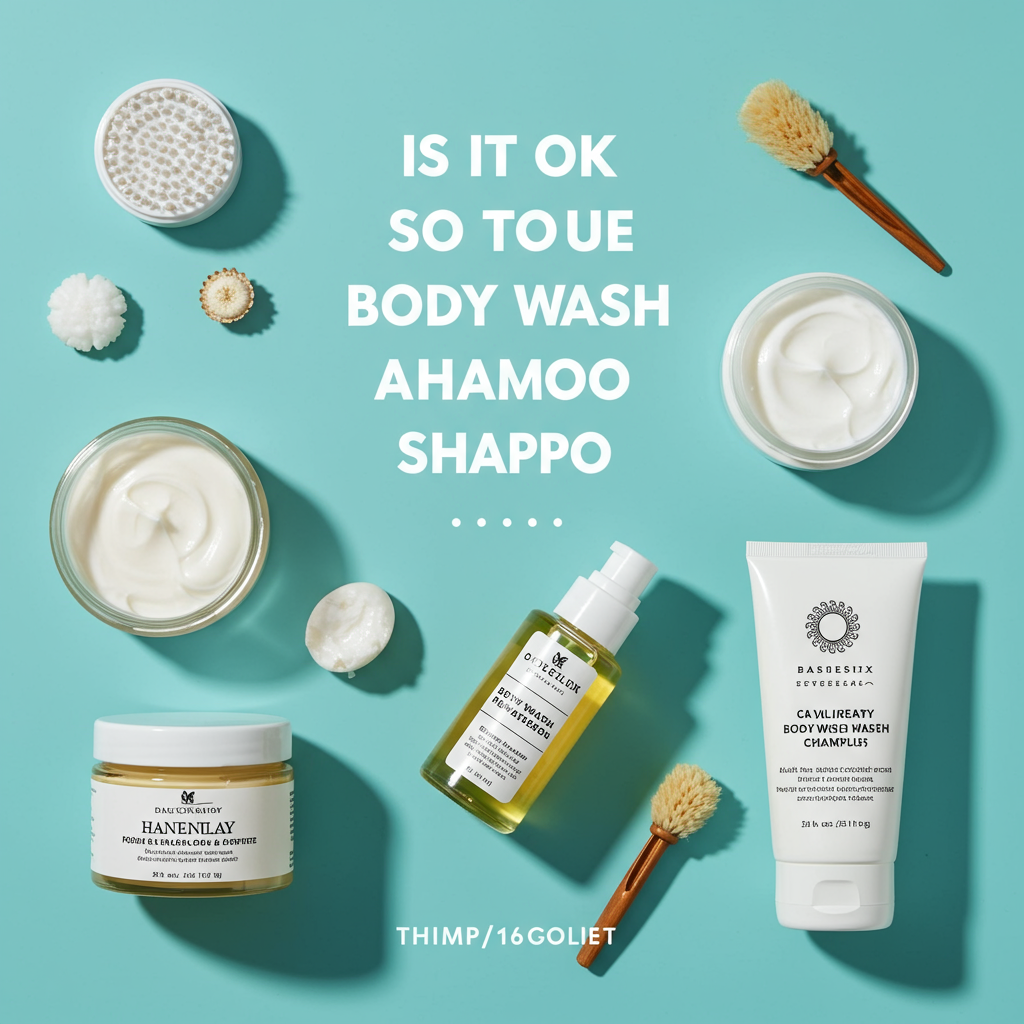We’ve all been there: you’re in the shower, half-asleep, reach for your shampoo bottle, and… it’s empty. Or perhaps you’re traveling light, trying to minimize bottles, and wonder if that versatile body wash can pull double duty for your hair. The question, “Is it ok to use body wash as shampoo?” crosses many minds, often out of convenience or necessity. While it might seem like a simple swap – after all, both are liquid cleansers – the truth is a bit more nuanced than you might think.
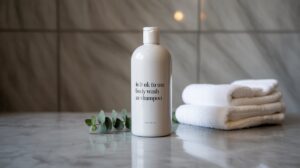
This comprehensive guide will dive deep into the world of personal care products, distinguishing between the formulations designed for your skin and those crafted for your hair. We’ll explore the immediate and long-term effects of using body wash on your delicate strands, discuss when it might be acceptable in a pinch, and highlight the best practices for maintaining optimal hair and scalp health. Understanding these differences is key to avoiding potential damage and ensuring your hair looks and feels its best. Let’s unravel the mystery and get to the bottom of whether your body wash can truly stand in for your shampoo.
The Core Differences: Body Wash vs. Shampoo
At first glance, body wash and shampoo might appear interchangeable. Both are designed to cleanse, lather, and rinse away dirt and oils. However, beneath their similar appearances lie significant differences in their chemical compositions, intended functions, and the specific needs they cater to.
Formulations and Ingredients
The primary distinction between these two products lies in their ingredient lists. Shampoos are formulated to clean hair and scalp, often containing:
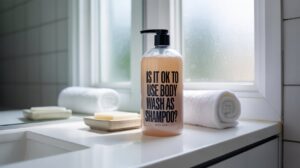
- Stronger Surfactants: These are cleansing agents that create lather and remove oil and dirt. Shampoos typically use more potent surfactants to tackle the natural oils (sebum) produced by the scalp and any product buildup on the hair shaft.
- Conditioning Agents: Many shampoos include ingredients like silicones, polymers, and proteins to help detangle, add shine, and reduce frizz. These are crucial for hair manageability.
- Targeted Ingredients: Shampoos often feature ingredients specific to hair concerns, such as keratin for strengthening, salicylic acid for dandruff, or color-safe ingredients for treated hair.
- pH Balancers: Shampoos are generally formulated to be slightly acidic (pH 4.5-5.5) to keep the hair cuticle smooth and prevent frizz.
Body washes, on the other hand, are designed for the skin, which has different needs. They tend to contain:
- Milder Surfactants: Skin is more sensitive than hair, so body washes typically use gentler cleansing agents to avoid stripping the skin of its natural moisture.
- Moisturizers: Ingredients like glycerin, shea butter, and various oils are common in body washes to hydrate and nourish the skin, leaving it soft and supple.
- Emollients: These help to smooth and soften the skin, providing a protective barrier.
- Fragrances: Body washes often contain stronger and more persistent fragrances, as skin is less prone to irritation from them compared to the scalp and hair.
pH Levels and Their Impact
The pH level is a critical factor. Our skin has a slightly acidic pH (around 4.7-5.7), which helps maintain its protective barrier. Hair, too, thrives in a slightly acidic environment (pH 4.5-5.5) because it helps to keep the cuticles sealed, resulting in smooth, shiny hair. Many body washes are formulated to match the skin’s pH, but some can be more alkaline. Using an alkaline product on hair can:
- Cause the hair cuticles to lift, leading to frizz, tangles, and dullness.
- Strip natural oils more aggressively, making hair dry and brittle.
- Potentially irritate the scalp, leading to dryness or flakiness.
Target Areas and Concerns
Shampoos focus on cleaning the scalp to remove excess sebum and product buildup, while also addressing the needs of the hair strands themselves (e.g., adding volume, moisture, or strength). Body washes, conversely, are primarily concerned with cleansing the skin without over-drying, often leaving behind a moisturizing film. The specific concerns they aim to solve are fundamentally different.
Is It Ok To Use Body Wash As Shampoo? The Short-Term vs. Long-Term Effects
So, what really happens when you try to use body wash as shampoo? The outcome can vary depending on your hair type, the specific body wash, and how frequently you make the swap.
Immediate Results: What to Expect
In a pinch, using body wash on your hair once or twice might not lead to catastrophic results. You might notice:
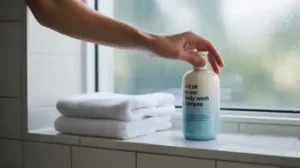
- Clean but Stripped Feel: Your hair will likely feel clean, perhaps even squeaky clean, but it might also feel rough or dry. This is due to the harsher surfactants and lack of conditioning agents.
- Difficulty Detangling: Without the lubricating properties of shampoo’s conditioning ingredients, your hair may be harder to comb through after washing.
- Lack of Shine: The lifted cuticles can prevent light from reflecting properly, resulting in duller-looking hair.
- Heavier Scent: Body washes often have stronger fragrances that might linger on your hair more than a typical shampoo.
For individuals with very oily hair, a body wash might initially seem effective at cutting through grease. However, this often comes at the cost of your hair’s health.
Long-Term Consequences for Hair and Scalp
Repeatedly using body wash on your hair can lead to a host of problems:
- Excessive Dryness and Brittleness: The strong cleansing agents and higher pH levels can strip your hair of its natural oils, leading to chronic dryness, frizz, and increased breakage.
- Scalp Irritation: The scalp is sensitive. Ingredients in body wash (especially strong fragrances or certain surfactants) can cause dryness, itchiness, redness, or even flaking over time.
- Product Buildup: Some body washes contain moisturizing ingredients that are too heavy for hair. These can accumulate on the hair shaft and scalp, leading to greasy roots, dullness, and a heavy, lifeless feel.
- Color Fading: For color-treated hair, the harsher detergents in body wash can accelerate color fading, diminishing your investment.
- Lack of Hair-Specific Benefits: Your hair misses out on the targeted nourishment, strengthening, or volumizing benefits that a good shampoo provides.
Ultimately, while a single use might not cause permanent damage, consistent use of body wash as shampoo is a recipe for unhealthy, unhappy hair.
Who Might Get Away With It (and Who Shouldn’t)
If anyone can ‘get away with it,’ it’s likely individuals with:
- Very Oily, Untreated Hair: They might experience less immediate dryness, but still risk long-term damage.
- Short Hair: Shorter hair is replaced more frequently and is less prone to tangling and visible damage from a single wash.
However, nearly everyone will benefit from using dedicated shampoo. Those who absolutely should not use body wash on their hair include:
- Individuals with dry, damaged, or brittle hair.
- Anyone with color-treated or chemically processed hair.
- People with a sensitive or flaky scalp.
- Those with fine hair, which can easily become weighed down or overly stripped.
- Anyone with curly or coily hair, which is naturally drier and more prone to frizz and breakage.
When Emergency Strikes: Using Body Wash on Hair in a Pinch
Okay, so it’s not ideal, but life happens. If you absolutely must use body wash on your hair because there’s no other option, here’s how to minimize potential harm.
Best Practices for Temporary Use
If you find yourself in a bind and need to wash your hair with body wash, follow these steps:
- Choose Wisely: Opt for a body wash that is labeled as “moisturizing,” “gentle,” “fragrance-free,” or “for sensitive skin.” These are less likely to contain harsh detergents or strong perfumes. Avoid anything labeled “exfoliating” or “deep cleansing.”
- Use Sparingly: You don’t need a lot. A small amount, roughly a dime to nickel size, should be sufficient for most hair lengths.
- Focus on the Scalp: Gently massage the body wash primarily into your scalp to cleanse the roots. Allow the lather to run down the length of your hair as you rinse, rather than scrubbing the ends.
- Rinse Thoroughly: Rinse your hair for an extra minute or two to ensure all residue is removed. Leftover body wash can weigh hair down or irritate the scalp.
- Follow with Conditioner (Crucial!): If you have conditioner available, use a generous amount, especially on the mid-lengths and ends, to help restore moisture and detangle. Leave it on for an extra minute.
- Air Dry if Possible: Avoid heat styling immediately after, as your hair might be more vulnerable to damage.
Types of Body Wash to Avoid on Hair
Absolutely steer clear of these body wash types for your hair:
- Exfoliating Body Washes: These often contain microbeads or other physical exfoliants that can snag and damage hair strands.
- Strongly Scented Body Washes: High fragrance content can be irritating to the scalp and leave an overpowering smell on your hair.
- “Deep Cleansing” or “Deodorizing” Body Washes: These are typically formulated with stronger detergents that will be too harsh for your hair.
- Body Washes with Shimmer or Glitter: While fun for the body, these can stick to hair and be difficult to rinse out.
Post-Wash Hair Care Tips
After an emergency body wash shampoo, prioritize gentle care:
- Apply a leave-in conditioner or hair oil to provide extra moisture and protection.
- Use a wide-tooth comb to detangle very carefully, starting from the ends and working your way up.
- Limit heat styling for the next few days to give your hair a break.
- Consider a hair mask or deep conditioning treatment during your next proper wash.
The Best Alternatives to Body Wash for Hair
Rather than asking “Is it ok to use body wash as shampoo?” when you’re out, consider these better alternatives for hair cleansing.
Dedicated Shampoos for Specific Hair Types
The best solution is always a shampoo formulated for your specific hair needs. Whether you have oily, dry, fine, thick, color-treated, or curly hair, there’s a shampoo out there designed to clean effectively without causing damage and provide targeted benefits. Investing in a good quality shampoo and conditioner tailored to your hair type is the foundation of healthy hair care.
Co-Washing and Cleansing Conditioners
For those with dry, curly, or delicate hair, co-washing (washing with conditioner) or using a dedicated cleansing conditioner can be a fantastic alternative. These products gently cleanse the hair and scalp without stripping natural oils, leaving hair moisturized and manageable. They are designed for hair and maintain its natural balance.
Dry Shampoo and Water-Only Washing
If your hair isn’t excessively dirty but just needs a refresh, dry shampoo is an excellent temporary fix. It absorbs excess oil and adds volume without the need for water. For a truly minimalist approach, some people successfully practice water-only washing, where they simply rinse their hair thoroughly with water and use a scalp massage to distribute natural oils. While not for everyone, it’s certainly better than using body wash.
Recommended Products
While the goal is to avoid using body wash on your hair, having the right products on hand can prevent those emergency situations. Here are a few suggestions that prioritize gentle cleansing and effective hair care, or offer great solutions for travel.
L’Oréal Paris EverPure Sulfate-Free Shampoo
A gentle, sulfate-free shampoo ideal for color-treated hair or those seeking a less harsh cleanse. Helps maintain hair’s natural moisture.
Aveeno Pure Renewal Shampoo
Formulated with seaweed extract, this shampoo balances moisture and cleanses gently, suitable for most hair types, including sensitive scalps.
Not Your Mother’s Clean Freak Dry Shampoo
An excellent option for refreshing hair between washes, absorbing oil and adding volume without water. Perfect for avoiding emergency washes.
OGX Coconut Miracle Oil Shampoo
A hydrating shampoo known for its nourishing properties, great for dry or damaged hair, helping to restore softness and shine.
Frequently Asked Questions (FAQ)
Q1: Can I use bar soap as shampoo?
A: While technically possible, using regular bar soap as shampoo is generally not recommended. Most bar soaps are highly alkaline (high pH) and can severely strip your hair of natural oils, leading to extreme dryness, frizz, and residue buildup. They can also leave your hair feeling stiff and dull. There are specific “shampoo bars” formulated for hair that are a much better alternative.
Q2: What happens if I use body wash on my hair just once?
A: Using body wash on your hair once is unlikely to cause permanent damage. Your hair might feel a bit drier, rougher, or more tangled than usual due to the different formulation and pH. It might also lack shine. However, a single use typically won’t lead to long-term issues, especially if you follow up with a good conditioner and return to your regular shampoo.
Q3: Is all-in-one body wash/shampoo good for daily use?
A: All-in-one products (like 2-in-1 shampoo and conditioner, or even 3-in-1 hair, face, and body washes) are convenient, especially for travel or gym bags. However, they are often a compromise. While they can be okay for occasional use or for those with very short, low-maintenance hair, they typically don’t provide the specialized care that dedicated shampoos and conditioners offer. Regular use might leave hair less moisturized or adequately cleansed compared to using separate products.
Q4: Will body wash damage my hair permanently?
A: One or two uses of body wash on your hair will almost certainly not cause permanent damage. The hair and scalp are resilient. However, chronic or regular use of body wash as shampoo can lead to cumulative damage, including chronic dryness, breakage, scalp irritation, and dullness, which can be difficult to reverse without significant time and specialized treatments.
Q5: What’s the best thing to use if I truly run out of shampoo and have no other options?
A: If you’re in a dire emergency with absolutely no shampoo, dry shampoo, or even baking soda (which can absorb oil), and only body wash is available, opt for the mildest, most moisturizing, and fragrance-free body wash you can find. Use a very small amount, focus on the scalp, rinse thoroughly, and apply conditioner if available. Alternatively, simply rinse your hair with plain water to remove some dirt and oil until you can get proper shampoo.
Q6: Is it okay to use body wash as shampoo for color-treated hair?
A: Absolutely not. Using body wash on color-treated hair is highly discouraged, even in an emergency. The harsher surfactants and potentially higher pH of body wash can strip hair color much faster than a color-safe shampoo, leading to premature fading and dullness. It can also exacerbate dryness and damage in already compromised, color-treated strands.
Conclusion
The burning question, “Is it ok to use body wash as shampoo?” has a clear answer: generally, no, it’s not ideal. While a one-off emergency might not spell disaster for your strands, making it a habit can lead to a host of hair and scalp problems, including dryness, frizz, dullness, and irritation. The distinct formulations, pH levels, and targeted ingredients in shampoos and body washes exist for good reason, catering to the unique needs of your hair and skin, respectively.
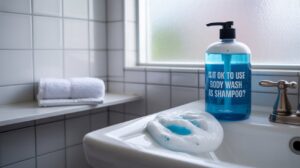
Understanding these differences empowers you to make better choices for your personal care routine. Always prioritize dedicated hair care products designed for your specific hair type to maintain its health, shine, and manageability. If you ever find yourself without shampoo, remember that gentle alternatives like co-washing, dry shampoo, or even a thorough water rinse are far better options than resorting to body wash. Invest in your hair, and it will thank you with vibrancy and strength for years to come. Your hair deserves the right kind of love!
